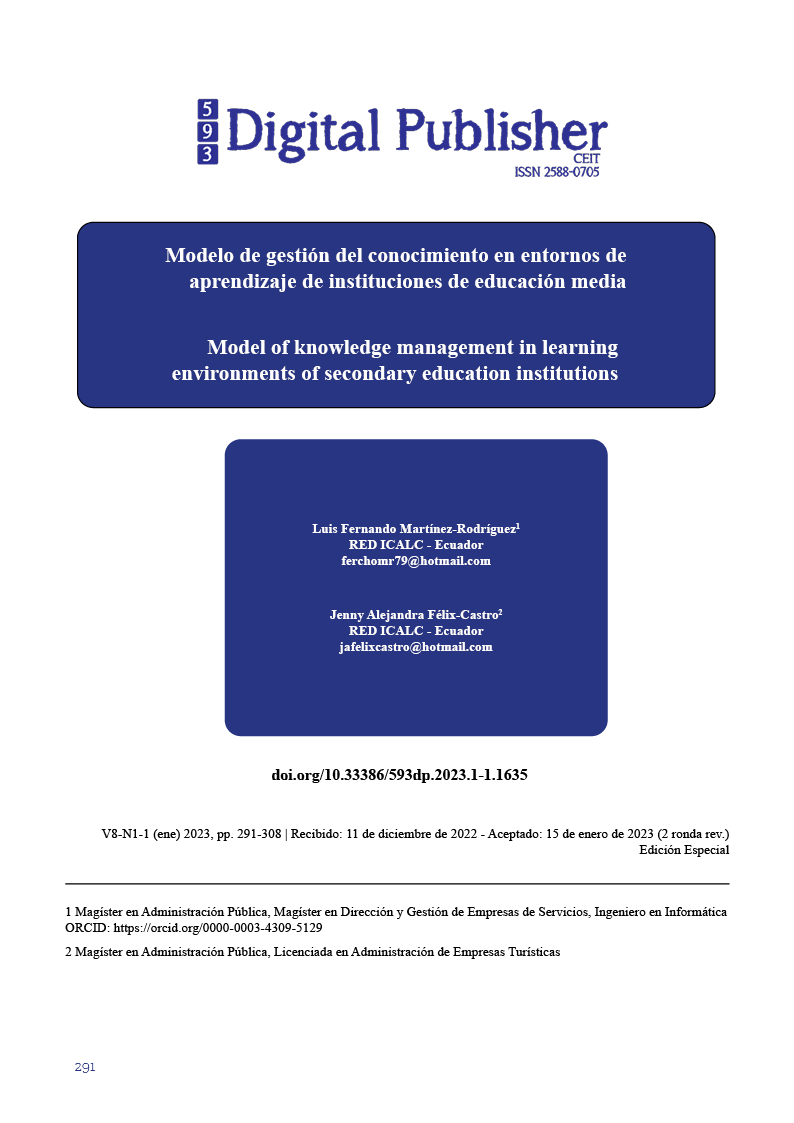Model of knowledge management in learning environments of secondary education institutions
Main Article Content
Abstract
Abstract: Currently, learning environments have evolved thanks to new information and communication technologies, in this sense, their scope has been oriented to non-attendance. Knowledge management is the comprehensive management of methodologies for the maturation and continuous improvement of the learning curve of pedagogical processes within secondary education institutions. The objective of this research is to analyze the relationship between knowledge management and the effective virtual learning environment in secondary education institutions. Using an instrument diagrammed in Google Froms with Prahs knowledge management scales and Nesbyt virtual environments, a sample of 981 officials and teachers from the Zonal Coordination of Education of Zone 2 of the Ministry of Education of Ecuador was surveyed. The results of the study show that there is a relationship between the fundamental categories of the study variables.
Downloads
Article Details

This work is licensed under a Creative Commons Attribution-NonCommercial-ShareAlike 4.0 International License.
1. Derechos de autor
Las obras que se publican en 593 Digital Publisher CEIT están sujetas a los siguientes términos:
1.1. 593 Digital Publisher CEIT, conserva los derechos patrimoniales (copyright) de las obras publicadas, favorece y permite la reutilización de las mismas bajo la licencia Licencia Creative Commons 4.0 de Reconocimiento-NoComercial-CompartirIgual 4.0, por lo cual se pueden copiar, usar, difundir, transmitir y exponer públicamente, siempre que:
1.1.a. Se cite la autoría y fuente original de su publicación (revista, editorial, URL).
1.1.b. No se usen para fines comerciales u onerosos.
1.1.c. Se mencione la existencia y especificaciones de esta licencia de uso.
References
Byrne, B. (2009). Structural equation modelling with AMOS: Basic concepts, applicationsand programming . New York: Routledge/Taylor and Francis.
Barrera, H., Barragán, T., & Ortega, G. (2017). La realidad educativa ecuatoriana desde una perspectiva docente. Revista Iberoamericana de Educación, 75(2), 9-20. Obtenido de file:///C:/Users/Lenovo%20x260/Downloads/2629-Texto%20del%20art%C3%ADculo-724-1-10-20171227.pdf
Rodríguez, D. (2009). La creación y gestión del conocimiento en las organizaciones educativas: barreras y facilitadores. (Tesis Doctoral). Universidad Autónoma de Barcelona, España.
Roncancio, C. (2019). Evaluación de los entornos virtuales de enseñanza aprendizaje (EVEA) de la Universidad Santo Tomás Bucaramanga (Colombia) mediante la adaptación y aplicación del sistema Learning Object Review Instrumento (LORI). (Tesis Doctoral). Universitat de les Illes Balears, Colombia.
Fandos, M. (2003). Formación basada en las tecnologías de la información y comunicación: Análisis didáctico del proceso de enseñanza-aprendizaje. (Tesis Doctoral). Universitat Rovira I Virgili, Tarragona.
Kumar, S., Luthra, S., Kumar, S., Tyagi, M., & Eknath, B. (2018). Benchmarking the logistics management implementation using Delphi and fuzzy DEMATEL. Benchmarking: An International Journal, 25(6). doi:ISSN: 1463-5771
Quiroga, D., Torrent, J., & Murcia, C. (2017). Usos de las TIC en América Latina: una caracterización. Ingeniare, 25(2), 289-305. doi:http://dx.doi.org/10.4067/S0718-33052017000200289
Moreno, P., Román, A., & Olivares, F. (2021). Tim Berners-Lee frente a los dueños de Internet en la era de la sobre información. Revistas Científicas Complutenses, 27(1). doi:https://doi.org/10.5209/esmp.71328
García, J., & Donoso, M. (2019). Comunidad de conocimiento y evolución humana. Education in the Knowledge Society, 20, 16-28. doi:https://doi.org/10.14201/eks2019_20_a16
Martínez, M., Sádaba, C., & Serrano, J. (2021). Meta-marco de la alfabetización digital: análisis comparado de marcos de competencias del Siglo XXI. Revista Latina de Comunicación Social, 79, 76-110. doi:https://www.doi.org/10.4185/RLCS-2021-1508
Ramírez, J. (2020). El enfoque por competencias y su relevancia en la actualidad: Consideraciones desde la orientación ocupacional en contextos educativos. Revista Electrónica Educare (Educare Electronic Journal), 24(2), 1-15. doi:https://doi.org/10.15359/ree.24-2.23
Jeronimo, E., & Juárez, L. (2018). El índice de la Economía del Conocimiento: una propuesta para su cálculo a nivel municipal. Espacios, 39(53), 21. doi:ISSN: 0798-1015
Salas, G., & Juárez, L. (2018). Hacia un modelo de desarrollo rural integral sustentable basado en la sociedad del conocimiento. Espacios, 39(53), 9. doi:ISSN:0798-1015
Escorcia, J., & Barros, D. (2020). Gestión del conocimiento en Instituciones de Educación Superior: Caracterización desde una reflexión teórica. Revista de Ciencias Sociales, 26(3), 83-97. doi:ISSN:1315-9518
Acevedo, Y., Valencia, A., Gómez, S., & Arias, C. (2019). Alternativas para modelos de gestión del conocimiento en Instituciones de Educación Superior. Ingeniare. Revista chilena de ingeniería, 27(3), 410-420. doi:http://dx.doi.org/10.4067/S0718-33052019000300410
Arrieta, N., & Valdés, J. (2020). Diseño y validación de un modelo de gestión del capital intelectual para la calidad de Instituciones de Educación Superior, Colombia. Revista de Psicología y Ciencias afines., 37(1), 159-174. doi:http://doi.org/10.16888/interd.2020.37.1.10
Blanco, C., Bernal, C., Camacho, F., & Díaz, M. (2018). Industrias Creativas y Culturales: Estudio desde el Enfoque de la Gestión del Conocimiento. Información tecnológica, 29(3), 15-28. doi:http://dx.doi.org/10.4067/S0718-07642018000300015
Llorca, J. (2021). Aporías de la investigación en arquitectura: adaptación del modelo científico en la producción y divulgación del conocimiento explícito. Architecture, City and Environment, 16(46), 1-21. doi:http://dx.doi.org/10.5821/ace.16.46.9531
Mejía, J., Rodriguez, I., Giron, H., & Muñoz, M. (2019). La Gestión del Conocimiento en la Mejora de Procesos de Software: una Revisión Sistemática de la Literatura. IEEE Xplore, 14, 19-22. doi:doi:10.23919/cisti.2019.8760614
Sánchez, M., López, J., & Toussaint, M. (2019). Conocimiento práctico de directores escolares participantes en un dispositivo de formación. Revista de currículum y formación del profesorado, 23(2), 108-130. doi:https://doi.org/10.30827/profesorado.v23i2.9390
Cockerham, D., Lin Lin, S., & Schwartz , M. (2021). Voices of the students: Adolescent well-being and social interactions during the emergent shift to online learning environments. Springer Link, 26, 7523–7541. doi:https://doi.org/10.1007/s10639-021-10601-4
Schaffrath, J. (2021). Concept for a Teaching Medium for Immersive Forms of Teaching in Automation Technology. Springer Link, 298. doi:10.1007/978-3-030-82529-4_53
Hsing-Chung, C., Eko, P., Prayitno, Sri Suning, K., Shian-Shyong, T., Tzu-Liang, K., & Kuei-Yuan, W. (2021). Learning Performance Prediction with Imbalanced Virtual Learning Environment Students’ Interactions Data. Springer Link, 279. doi:10.1007/978-3-030-79728-7_33
Hua, K., Phui, P., & Mohd, N. (2021). Higher Education Students’ Online Instruction Perceptions: A Quality Virtual Learning Environment. Sustainability, 13(19), 1-24. doi:https://doi.org/10.3390/su131910840
Korucu, S. (2021). Preparing student teachers for real classrooms through virtual vicarious experiences of critical incidents during remote practicum: A meaningful-experiential learning perspective. Springer Link, 26, 6949–6971. doi:https://doi.org/10.1007/s10639-021-10555-7
Ramos, M., Buitrago, P., & Camacho, R. (2021). Collaborative and Contextual Learning Experience, Supported in Virtual Scenarios and Software Defined Radio Tools, for the Development of a Communications Laboratory in Engineering. Springer Link, 298. doi:10.1007/978-3-030-82529-4_45
Silva, L., Salomão, L., Rigo, S., Barbosa, J., Leithardt, D., & Quietinho, V. (2021). A Literature Review on Intelligent Services Applied to Distance Learning. Education Sciences, 11(11). doi:https://doi.org/10.3390/educsci11110666
Rodriguez, M., Nuñez, M., & Esparza, I. (2018). Prueba empírica del modelo de Gestión del Conocimiento de Nonaka y Takeuchi en el contexto universitario. Espacios, 39(49). doi:ISSN 0798 1015
Nonaka, I., & Takeuchi, H. (1995). The Knowledge-Creating Company How Japanese Companies Create the Dynamics of Innovation. New York: Oxford University Press.
Prahs, P., Radeck, V., Mayer, C., & Cvetkov, Y. (2018). OCT-based deep learning algorithm for the evaluation of treatment indication with anti-vascular endothelial growth factor medications. Graefes Arch Clin Exp Ophthalmol, 91-98. doi:https://doi.org/10.1007/s00417-017-3839-y
Castaneda, I., Manrique, L., & Cuellar, S. (2017). Is organizational learning being absorbed by knowledge management?A systematic review. JOURNAL OF KNOWLEDGE MANAGEMENT, 22(2), 299-325. doi:10.1108/JKM-01-2017-0041
Moşteanu, N. (2020). Challenges for organizational structure and design as a result of digitalization and cybersecurity. The Business and Management Review, 11(1), 278-286.
Nesbit, J., Belfer, K., & Leacock, T. (2003). Learning Object Review Instrument (LORI). International Journal of Computers and Applications, 25(3), 1 - 8. Obtenido de http://citeseerx.ist.psu.edu/viewdoc/download?doi=10.1.1.457.8467&rep=rep1&typ
Royce, C., Hayes, M., & Schwartzstein, R. (2019). Teaching Critical Thinking: A Case for Instruction in Cognitive Biases to Reduce Diagnostic Errors and Improve Patient Safety. Academic Medicine, 94(2), 187-194. doi:10.1097/ACM.0000000000002518
Samarraie, H., & Saeed, N. (2018). A systematic review of cloud computing tools for collaborative learning: Opportunities and challenges to the blended-learning environment. Computers & Education, 124, 77-91. doi:10.1016/j.compedu.2018.05.016
Gube, M., & Lajoie, S. (2020). Adaptive expertise and creative thinking: A synthetic review and implications for practice. Thinking Skills and Creativity, 35. doi:https://doi.org/10.1016/j.tsc.2020.100630
Boot, F., Owuor, J., Dinsmore, J., & MacLachlan, M. (2018). Access to assistive technology for people with intellectual disabilities: a systematic review to identify barriers and facilitators. Journal of Intellectual Disability Research, 62(10), 1-20. doi:https://doi.org/10.1111/jir.12532
La Torre, M., Sabelfeld, S., Blomkvist, M., Tarquinio, L., & Dumay, J. (2018). Harmonising non-financial reporting regulation in Europe: Practical forces and projections for future research. Meditari Accountancy Research, 26(4). doi:https://doi.org/10.1108/MEDAR-02-2018-0290
Lévy, J., & Varela, J. (2006). Modelización con estructuras de covarianzas en ciencias sociales. Temas esenciales, avanzados y aportaciones especiales. Barcelona: Gesbiblo.



